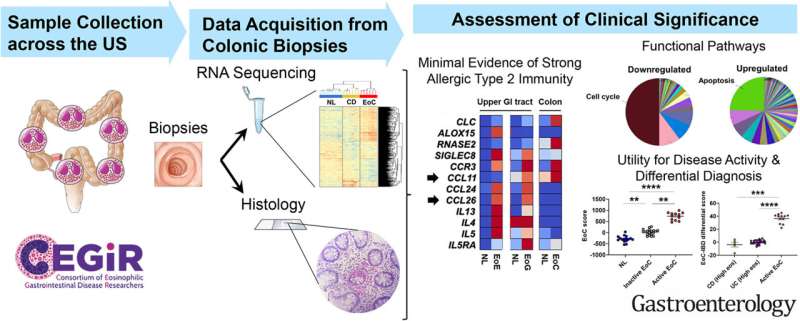Genetics of eosinophilic colitis revealed

A condition called eosinophilic colitis is distinct from other, similar eosinophilic gastrointestinal diseases and inflammatory bowel disease, according to a genetic analysis published in Gastroenterology.
The findings provide basis for improved diagnosis and treatment, according to Nicoleta Arva, MD, Ph.D., associate professor of Pathology in the Division of Pediatric Pathology and a co-author of the study.
"In the era of personalized medicine, it is important to design targeted therapies based on specific genetic alterations," Arva said.
Eosinophilic gastrointestinal diseases (EGIDs) are caused when specific white blood cells infiltrate the gastrointestinal tract, causing chronic inflammation and tissue damage. This can occur in several locations, including the esophagus, stomach and colon.
While eosinophilic esophagitis (EoE) is the most common EGID, eosinophilic colitis (EoC) has more severe symptoms and comorbidities. Beyond EGIDs, EoC also has overlap with inflammatory bowel disease (IBD) and other diseases that manifest with gut eosinophilic inflammation—complicating diagnosis and treatment development, according to Arva.
In the current study, investigators performed RNA sequencing on colon biopsies from 61 subjects with either EoC, Crohn's1 disease or healthy controls. Nearly 1,000 genes were differentially expressed in EoC compared to normal participants. Some genes, including CCL11 and CLC, were positively correlated with colonic eosinophil count, a marker of EoC severity.
These genes, and others that were highly expressed in EoC, are involved with decreased cell-cycle functions and increased cell death. This was unexpected, according to Arva, as enrichment of these functions is not seen in other EGIDs.
Further, the scientists developed an "EoC score" that measures departure from normality in the expression of certain EoC-associated genes. Patients with EoC had a significantly higher score compared to patients without EoC, and a modified score also distinguished patients with EoC from those with IBD.
"This study established eosinophilic colitis as a distinct disease, different from other EGIDs and IBD," Arva said.
These findings also signal which genes and pathways to target for therapeutic development, according to Arva, as previous studies have shown benefits of reducing expression of CLC proteins for treating some inflammation-related symptoms of asthma.
"Similarly, these antibodies may be beneficial for relieving eosinophilic tissue inflammation in EoC," Arva said.
More information: Tetsuo Shoda et al, Evaluating Eosinophilic Colitis as a Unique Disease using Colonic Molecular Profiles: A Multi-Site Study, Gastroenterology (2022). DOI: 10.1053/j.gastro.2022.01.022



















